Editor:
Brandon Sweet
University Communications
bulletin@uwaterloo.ca
Today, Waterloo remembers

The University of Waterloo community will join the rest of the country in pausing for a few moments today to remember Canada's war dead.
The official date of the Remembrance Day commemoration is always November 11, the anniversary of the day in 1918 when the guns fell silent at the end of the First World War.
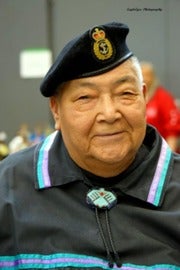 The Faculty of Health and Indigenous Knowledge Keeper Myeengun Henry will be hosting a ceremony in the Student Life Centre’s Great Hall beginning at 10:45 a.m. Myeengun Henry will provide welcoming remarks, followed by a recorded recitation of the famous John McCrae poem In Flanders Fields, by Indigenous veteran Arnold Albert (pictured at right).
The Faculty of Health and Indigenous Knowledge Keeper Myeengun Henry will be hosting a ceremony in the Student Life Centre’s Great Hall beginning at 10:45 a.m. Myeengun Henry will provide welcoming remarks, followed by a recorded recitation of the famous John McCrae poem In Flanders Fields, by Indigenous veteran Arnold Albert (pictured at right).
Students will lower flags at 10:58 a.m. as the Last Post is played. There will be two minutes of silence at 11:00 a.m., followed by the playing of Reveille as the flags are raised again. A video featuring veterans will follow.
Additionally, flags across the University of Waterloo will be at half-mast today in accordance with our flag guidelines to mark Remembrance Day.
Remembrance Day ceremonies are planned across the region today.
In Waterloo, a parade will begin at 10:00 a.m. and make its way to the Waterloo Cenotaph behind City Hall.
In Kitchener, the parade will start at Ontario Street at 10:30 a.m. and head to the Kitchener Cenotaph located on Duke Street.
In Cambridge, the Royal Canadian Legion will host a ceremony at the Cenotaph in Queens Square in Galt at 11:00 a.m., with a parade to follow back to the Legion branch. Similar ceremonies will be held in Preston and Hespeler.
In Stratford, there will be a parade and ceremony at 10:45 a.m. at the Cenotaph.
This year also marks the 150th anniversary of the birth of John McCrae, and the City of Guelph will be holding a special ceremony at the McCrae House Memorial Gardens on Water Street starting at 8:30 a.m.
Remembrance Day is an important reminder
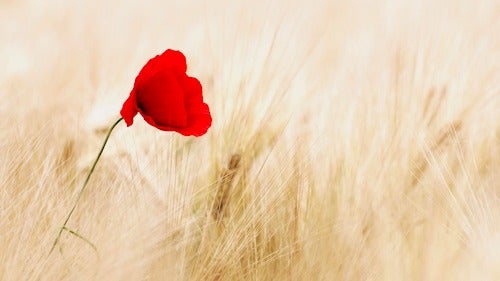
By Vivek Goel, President and Vice-Chancellor.
On November 11th, we remember and honour all the individuals who have and continue to serve in Canada’s military services. While terms like values, freedoms and rights have recently been connected to political rhetoric of our times, the basis of these definitions regardless of their interpretation are a result of the sacrifice and on-going contributions of many.
Remembrance Day was established in 1919 to mark the end of the First World War and has evolved over the years to recognize the brave men and women who have died in service to their country. This year, in the midst of unrest, war and geopolitical tensions around the world, it is important to remember that Remembrance Day is also an occasion to champion peace.
Last year, I discussed the experiences of Canada’s Indigenous, Black, and other racialized soldiers who served Canada bravely while also facing discrimination at home, and the anniversary of the first conflict (Gulf War) in which women served in combat roles within Canada’s Armed Forces. There are many stories of the bravery and courage of Canadian soldiers throughout our country’s history. I recently read several biographies of Indigenous veterans who resided in the Haldimand Tract, where the University of Waterloo’s teaching, learning, and research takes place. Those individuals played important roles within their regiments and units. As retired Waterloo History Professor James Walker described in his 1989 paper on race and recruitment, more than 3,500 Indigenous, 1,000 Black and hundreds of Chinese and Japanese men joined the Canadian Forces during WWI, yet racism and prejudice prevented more from enlisting.
While Canada may have its share of challenges, we should all be grateful for the peace, freedom and security that many of us take for granted. Whether here in Canada or abroad, there is still much to be done to bolster equity, freedom and security.
The Faculty of Health and Indigenous Knowledge Keeper Myeengun Henry will be hosting a ceremony in the SLC Great Hall beginning at 10:45 a.m. Whether you are able to attend or not, I encourage our community to pause and reflect at 11:00 a.m. to honour the brave individuals who served and continue to serve in the Armed Forces.
Remembrance and heroism
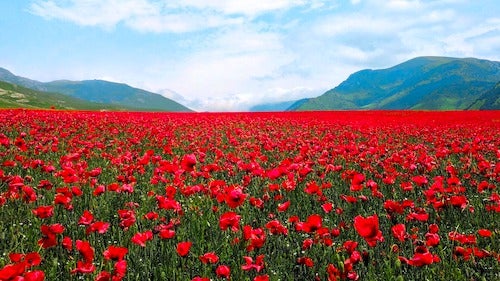
This article was originally published on Waterloo News.
Each year in Canada, November 11 is marked as Remembrance Day. Canadians come together on the eleventh hour of the eleventh day of the eleventh month, as that is the day and time when the armistice was signed to end the First World War.
We acknowledge the courage and sacrifice of those who served their country and acknowledge our responsibility to work for the peace they fought hard to achieve. Not all who serve are acknowledged as a hero, so this day is an opportunity to do so.
Yet here in 2022, there is a steady drumbeat of war, echoing in the daily news with reports from the war in Ukraine and ominous discussions of the potential use of nuclear weapons. This Remembrance Day we must reflect on the importance of supporting the Ukrainian war effort against the illegal invasion by Russia, says Dr. Veronica Kitchen, a professor of political science at the University of Waterloo.
“War is bad, but war is sometimes necessary,” she says. “You do everything that you can to avoid it and you do everything you can to prevent it and make sure it stops as soon as possible.”
But in a case like the war in Ukraine, where the Russian side has so clearly and blatantly violated international law, Kitchen sees the support of Canadian and other Western governments as absolutely justified.
Researching heroism
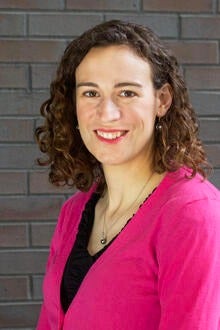 Kitchen’s recent research focuses on the ways heroism is portrayed in conflict. In the introduction for her recent edited collection Heroism and Global Politics, Kitchen and her co-author Dr. Jennifer G. Mathers of Aberystwyth University provide a specific example of how heroism can at times be complex and fraught.
Kitchen’s recent research focuses on the ways heroism is portrayed in conflict. In the introduction for her recent edited collection Heroism and Global Politics, Kitchen and her co-author Dr. Jennifer G. Mathers of Aberystwyth University provide a specific example of how heroism can at times be complex and fraught.
They write of the Ukrainian hero Nadiya Savchenko, who in the aftermath of the 2014 Maidan Revolution took up arms against rebel forces in the Donbas region. However, Savchenko would later be branded a traitor by some, as she called for a negotiated settlement of the conflict.
Heroism, as Kitchen explains, can be fickle or even cynically mobilized for political purposes, as in the case of Savchenko. But it can also be “used as a focal point around which people rally,” she says, pointing to the leadership of the current Ukrainian president, Volodymyr Zelenskyy.
From failing hands we throw the torch
While heroism is complex and Remembrance Day is typically a day when it is popular to say that there is no context in which war is justified, Kitchen says that we must see in some conflicts that there is still right and wrong.
“I can’t see a world in which it would have been possible to not react to a blatant violation of international law,” she says, referring to Russia’s invasion of Ukraine. And yet, as Kitchen points out, “the world is messy. We can be doing the right thing in one place and the wrong thing in another place.”
This Remembrance Day, in the context of increasing polarization and ongoing conflict, we must reflect on the importance of always seeking peace, but at the same time remain vigilant and prepared to do what is right when necessity calls.
Faculty of Health remembers Lilian Gobbi
by Jim Frank, Professor Emeritus, Kinesiology and Health Sciences.
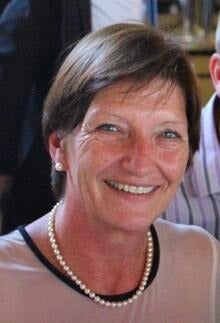 Dr. Lilian Gobbi (PhD '97) passed away unexpectedly on October 20, 2022. Professor Gobbi earned her PhD in Kinesiology from the University of Waterloo under the direction of the late professor Aftab Patla.
Dr. Lilian Gobbi (PhD '97) passed away unexpectedly on October 20, 2022. Professor Gobbi earned her PhD in Kinesiology from the University of Waterloo under the direction of the late professor Aftab Patla.
Gobbi, her husband, Sebastião, and their two young children, Ronaldo and Peri, arrived at the University of Waterloo from Brazil in 1992. Gobbi pursued her PhD in movement neuroscience, while Sebastião studied cardiorespiratory physiology with Dr. Richard Hughson.
Following completion of her PhD, she returned to São Paulo State University. Over her career, she built a world-class research lab focused on the study of normal and adaptive human gait and balance. Gobbi's stories of her time in Canada encouraged many more Brazilian students to pursue graduate studies at the University of Waterloo, including Dr. Luiz Santos, Dr. Renato Moraes, Dr. Veronica Myaskike-daSilva and Dr. Carolina Silveira.
She is remembered fondly by her students as a gifted mentor and talented researcher. She believed that students were key to the success of a research program and she instilled confidence, passion and the joy of scientific discovery in her students.
Friday's notes

The Waterloo.AI Data Challenge is taking place this weekend from 7:30 a.m. too 8:00 p.m. in DC 1350.
"Join us and our Industry host, Musashi AI for this exciting data challenge focused on a computer vision opportunity,” says a note from the organizers. “You and your team of 3-4 students will compete against others in this challenge for prizes and opportunities for the top teams. This event is exclusive to University of Waterloo students."
Also taking place this weekend is the annual Fusion Conference. This year's theme is "Advances in Healthcare Innovation" and will run from 10:30 a.m. to 7:00 p.m. in Fed Hall. The Fusion Conference, operating since 2004, is a conference hosted at the University of Waterloo that merges knowledge from science, business, and technology fields through a unique theme each year. The conference is organized by students from the Science and Business program, but undergraduate students and high school students are welcome and encouraged to attend.
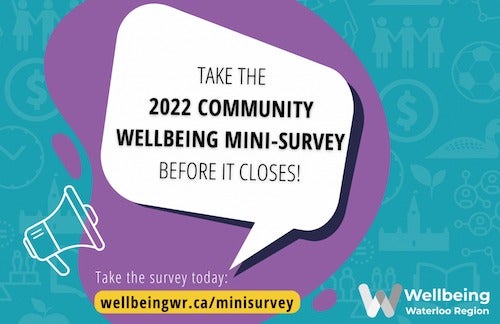
What would have the biggest impact on your wellbeing? Share your answer in the 2022 Community Wellbeing Mini-Survey. In partnership with the Canadian Index of Wellbeing (CIW) and many community organizations, Wellbeing WR is running the mini-survey to better understand the current state of community wellbeing and inequities in Waterloo Region after more than 2 years into the COVID-19 pandemic. The data from this survey will be used to improve services and support for people living in Waterloo Region and identify where change is needed most.
The survey is being administered by the Canadian Index of Wellbeing (CIW), based in the Faculty of Applied Health Sciences at the University of Waterloo. It will be based on eight domains that the CIW has identified as critical to our overall wellbeing: community vitality, healthy populations, democratic engagement, the environment, leisure and culture, education, living standards, and time use.
Participation in the survey is entirely voluntary and confidential, and provides an opportunity to win great local prizes.
You can access the survey through wellbeingwr.ca/minisurvey. The survey closes November 14.
The Future Cities Initiative is hosting Adrienne Pacini, a Partner at SHS Consulting, to present Hope for the Future of Housing. "In this Seminar Series talk. Ms. Pacini will address one of the most current and critical challenges in Canada: housing access and affordability," says a note from the Future Cities Initiative. "Ms. Panici will address the question, how will we realize the right to adequate housing in Canada? Come on a journey, through this presentation, to learn about tools and methods infusing foresight and systemic design into housing system innovation work, current and emerging trends in reimagining real estate and community investment, and social change initiatives bringing us hope for the future of housing and community."
Beyond the Bulletin Episode 144
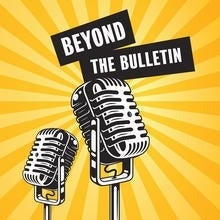
The latest episode of the Beyond the Bulletin podcast is now live. John McMinn, professor of architecture, discusses the tiny homes he and his students design and build to help address the issue of homelessness in our community. Masks are required for all indoor academic activity for the rest of the term. We rank fourth in Canada for sustainability. HR hosts information sessions with Green Shield Canada, our new benefits provider. And the University and Region of Waterloo launch a travel survey to learn about your commute.
Link of the day
When and Where to get support
Students can visit the Student Success Office online for supports including academic development, international student resources, immigration consulting, leadership development, exchange and study abroad, and opportunities to get involved.
Instructors looking for targeted support for developing online components for blended learning courses, transitioning remote to fully online courses, revising current online courses, and more please visit Agile Development | Centre for Extended Learning | University of Waterloo (uwaterloo.ca).
Instructors can access the EdTech Hub to find support on Waterloo’s centrally supported EdTech tools. The Hub is supported by members of IST’s Instructional Technologies and Media Services, Centre for Teaching Excellence, Centre for Extended Learning and subject matter experts from other campus areas.
Supports are available for employees returning to campus. Visit IST’s Hybrid Work and Technology guidelines and workplace protocols to assist with the transition.
Students with permanent, temporary and suspected disabilities and disabling conditions (medical conditions, injuries, or trauma from discrimination, violence, or oppression) can register with AccessAbility Services for academic accommodations (classroom accommodations, testing accommodations, milestone accommodations).
Instructors can visit AccessAbility Services' Faculty and Staff web page for information about the Instructor/Faculty role in the accommodation process. Instructors/Faculty members are legally required to accommodate students with disabilities. AccessAbility Services (AAS) is here to help you understand your obligations, and to offer services and resources to help you facilitate accommodations.
The Writing and Communication Centre has in-person and virtual services to support grad and undergrad students, postdocs and faculty with any writing or communication project. Services include one-to-one appointments, drop-ins at Dana Porter Library, online workshops, writing groups, English conversation practice, and custom in-class workshops.
Research Ethics: Find yourself with an ethical question, unsure if your work requires an ethics review, or need advice about putting together a research ethics application? Reach out to one of our friendly staff by booking a consultation or email us with your questions.
Co-op students can get help finding a job and find supports to successfully work remotely, develop new skills, access wellness and career information, and contact a co-op or career advisor.
The Centre for Career Action (CCA) has services and programs to support undergrads, grad students, postdocs, alumni, and employees in figuring out what they value, what they’re good at, and how to access meaningful work, co-op, volunteer, or graduate/professional school opportunities. Questions about CCA's services? Live chat, call 519-888-4047, or stop by our front desk in the Tatham Centre 8:30 a.m. to 4:30 p.m., Monday to Friday.
Drop-in to in-person Warrior Study Halls on Thursdays from 5:00 p.m. to 6:30 p.m. in DC and DP. Join a Peer Success Coach to set goals and work independently or in groups each week.
Renison's English Language Institute continues to offer virtual events and workshops to help students practice their English language skills.
If you feel overwhelmed or anxious and need to talk to somebody, please contact the University’s Campus Wellness services, either Health Services or Counselling Services. You can also contact the University's Centre for Mental Health Research and Treatment. Good2Talk is a post-secondary student helpline available to all students.
The Library is here to help, both in person and online. Our spaces are open for access to book stacks, study space, computers and printers, and the IST Help Desk. For in-depth support, meet one-to-one with Librarians, Special Collections & Archives and Geospatial Centre staff. Access our resources online for anywhere, anytime learning and research. Full details on current services and hours are available on the Library’s COVID-19 Update webpage.
The Faculty Association of the University of Waterloo (FAUW) continues to advocate for its members. Check out the FAUW blog for more information.
The University of Waterloo Staff Association (UWSA) continues to advocate for its members. Check out the UWSA blog for more information.
The Sexual Violence Prevention and Response Office (SVPRO) supports all members of the University of Waterloo campus community who have experienced, or been impacted, by sexual violence. This includes all students, staff, faculty and visitors on the main campus, the satellite campuses, and at the affiliated and federated Waterloo Institutes and Colleges. For support, email: svpro@uwaterloo.ca or visit the SVPRO website.
The Office of Indigenous Relations is a central hub that provides guidance, support, and resources to all Indigenous and non-Indigenous campus community members and oversees the University's Indigenization strategy.
The Waterloo Indigenous Student Centre, based at United College, provides support and resources for Indigenous students, and educational outreach programs for the broader community, including lectures, and events.
WUSA supports for students:
Peer support - MATES, Glow Centre, RAISE, Women’s Centre - Click on one of the links to book an appointment either in person or online for the term.
Food Support Service food hampers are currently available from the Turnkey Desk 24/7 in the Student Life Centre. Drop-off locations are also open again in SLC, DC, DP, SCH, and all residences.
Co-op Connection all available online.
Centre for Academic Policy Support - CAPS is here to assist Waterloo undergraduates throughout their experience in navigating academic policy in the instances of filing petitions, grievances and appeals. Please contact them at caps@wusa.ca.
WUSA Student Legal Protection Program - Seeking legal counsel can be intimidating, especially if it’s your first time facing a legal issue. The legal assistance helpline provides quick access to legal advice in any area of law, including criminal. Just call 1-833-202-4571.
Empower Me is a confidential mental health and wellness service that connects students with qualified counsellors 24/7. They can be reached at 1-833-628-5589.
GSA-UW supports for graduate students:
The Graduate Student Association (GSA-UW) supports students’ academic and social experience and promotes their well-being.
Advising and Support - The GSA advises graduate students experiencing challenges and can help with navigating university policies & filing a grievance, appeal, or petition.
Mental Health covered by the Health Plan - The GSA Health Plan now has an 80 per cent coverage rate (up to $800/year) for Mental Health Practitioners. Your plan includes coverage for psychologists, registered social workers, psychotherapists, and clinical counselors.
Dental Care - The GSA Dental Plan covers 60 to 70 per cent of your dental costs and by visiting dental professionals who are members of the Studentcare Networks, you can receive an additional 20 to 30 per cent coverage.
Student Legal Protection Program - Your GSA fees give you access to unlimited legal advice, accessible via a toll-free helpline: +1-833-202-4571. This advice covers topics including housing disputes, employment disputes, and disputes with an academic institution.
The Graduate House: Open Monday to Tuesday 11:30 a.m. to 7:00 p.m. and Wednesday to Friday 11:30 a.m. to 9:00 p.m. We’re open to all students, faculty, staff, and community members. The Graduate House is a community space run by the GSA-UW. We’re adding new items to the menu. Graduate students who paid their fees can get discounts and free coffee.
When and Where
Warriors vs. Laurier Blood Donation Battle. Join our “Waterloo Warriors” team on the Blood.ca website or app. #ItsInYouToGive
Warriors Game Day Tickets and Season Passes, on sale now. Cheer on your Warriors W/M Basketball, Football W/M Hockey and W/M Volleyball teams at home during the 2022-23 season. Purchase today.
Free Staff Workouts, Tuesdays and Thursdays until December 22, 12:15 p.m. to 12:45 p.m. Bootcamp-style classes in the CIF Field House and PAC. Open to all staff and supported by the Staff Excellence Fund. Find out more/register now.
Writing Café (online), Friday, November 11, 9:00 a.m. to 12 noon.
Remembrance Day ceremony, Friday, November 11, 10:45 a.m., Student Life Centre Great Hall.
Waterloo.AI Data Challenge - Fall 2022, Saturday, November 12, 7:30 a.m. to 8:30 p.m.
Fusion Conference, "Advances in Healthcare Innovation," Saturday, November 12, 10:30 a.m. to 7:00 p.m., UW Federations Hall.
Warrior’s Basketball Home Opener vs. Windsor,Saturday,November 12, (W) 6:00 p.m., (M) 8:00 p.m., Carl Totzke Court. Purchase Tickets.
Writing Café (online), Tuesday, November 15, 9:00 a.m. to 12 noon.
Fusing AI and Optimization, inaugural Distinguished Lecture Series presentation by Pascal Van Hentenryck, Georgia Tech, Tuesday, November 15, 11:00 a.m. in DC 1302.
Exercise as health care: past, present, and future featuring Dr. Paul Oh, cardiologist and medical director of the Cardiac Rehabilitation and Secondary Prevention Program at the UHN-Toronto Rehabilitation Institute, Tuesday, November 15, 6:30 p.m. online and in person at Health EXP 1689. Reception to follow in-person event. Please register in advance.
Editor:
Brandon Sweet
University Communications
bulletin@uwaterloo.ca